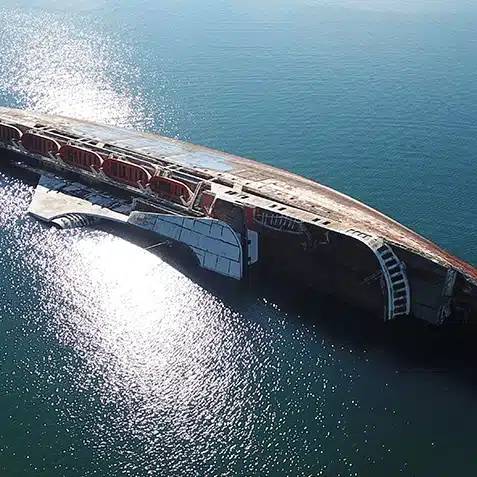Marine Salvage Operations Course
Diploma in Marine Salvage Operations
Marine Salvage Operations
This professional diploma in marine salvage delivers specialist training in vessel recovery, wreck removal and emergency operations at sea.
Designed for crew members, marine consultants, port authorities and insurance professionals, the course covers the technical, legal and operational aspects of salvage across both coastal and deep-sea contexts.
You’ll gain a comprehensive understanding of salvage law, risk management, equipment deployment, and multi-agency coordination — enabling you to contribute confidently to complex maritime recovery operations.

Professional Maritime Salvage Qualification
Train for a career in salvage consultancy, emergency response or operational recovery with a course built around real-world salvage scenarios and international best practice.
Contact us below to enrol today, or speak with our experienced course advisors.

Duration:
12 - 18 months
Learn at your own pace
Online Course:
Study from anywhere

Cost:
Diploma: £3,195
Certificate: £2,295

Recognised by: 
Marine Salvage Diploma vs Certification
Choose the right path for your career:
Comprehensive Training: Emergency towing procedures, heavy lift coordination, wreck clearance, legal frameworks under LOF contracts, environmental considerations and vessel stability under duress.
Flexible Study Duration: 12 – 18 month depending when you enrol to the program, study online at your own pace, from anywhere in the world.
Marine Industry Career Opportunities: 100% Online, with access to our student learning portal
Long-Term Career Impact: Marine Salvage Consultant, Salvage Officer, Emergency Response Coordinator, Insurance Surveyor, Marine Claims Specialist, Port Authority Risk Advisor.
Global Recognition: Our Diplomas are recognised by the University of Portsmouth and are supported by industry associations.
Assignments: One assignment is required to be completed and submitted at the end of each module, based on that particular subject.
Certification: you will receive a PDF Digital certificate (Printed Certificate Completion Pack available).
Final Examination: There will be a final examination upon completing and submitting all student assignments (exams are sat in April or October).
Post-Nominal letters: On passing the Diploma you can also use these letters after your name: MTA Dip MSalvage
Digital Course Badge: Upon successful completion students will receive an exclusive course badge for use on business cards, LinkedIn profiles and website(s)!
Diploma - £3,195
A recognised professional qualification in marine salvage operations, designed for those working in commercial recovery, vessel response or insurance-backed maritime claims.
✔
✔
✔
✔
✔
✔
✔
✔
✔
✔
Certificate - £2,295
A focused course for those who want insight into salvage procedures without formal assessments. Suitable for onboard crew, technical managers or entry-level salvage professionals.
✔
✔
✔
✔
✔
✔
✔
Marine Salvage Operations Curriculum: 10 Modules
This course follows the lifecycle of a salvage operation — from incident assessment and emergency response planning to recovery execution and post-operation reporting.
You’ll explore salvage law and LOF contracts, environmental and legal liabilities, stability risks, diver operations, tug deployment and the use of heavy lift and pumping equipment. The modules also cover inter-agency coordination, classification society requirements and casualty reporting procedures relevant to maritime salvage cases worldwide.
1. Introduction to The Salvage Industry
- An overview of world trade
- World casualty statistics
- The International Salvage Union
- International salvage companies
- Introduction to salvage law
- Admiralty law and jurisdiction
- Wreck Law
- International Marine Law
- The Flag State
- Governmental control of shipping
- Other organisations involved in the salvage industry
- The challenges facing the salvage industry
2. History of Salvage
- History of salvage
- Notable salvage operations
- Sources/references
3. Basics of Salvage
- Introduction
- Salvage principles
- The international convention on salvage
- Salvage claims
- Towage and salvage
- Role of the salvage master
- Role of the special casualty representative
- SCOPIC
- Place of safety and re-delivery to the owner
- General average and salvage
- Other important roles in salvage
4. The Law Of Salvage
- Salvage law background, sources and concepts
- Salvage law in the context of a salvage operation
- How the salvage award is assessed and paid
- Special Situations
5. Lloyd’s Open Form
- Background
- The beginning of Lloyd’s form
- The SCOPIC clause
- Lloyd’s form 2011
- The future
6. Alternative Agreements
- The Japanese form of salvage agreement
- The Turkish salvage agreement
- China Maritime Arbitration Commission Salvage Contract or ‘Beijing Form’
- The Russian Federation standard form of salvage contract
- The German Form or ‘Hamburg form’
- Alternative agreements
7. The Coastal State And The Salvor
- Introduction
- Territorial waters
- Innocent passage
- Shipping casualties that resulted in change
- The outcome of the casualties
- The coastal state
- Marine salvage companies
- Obligations of the salvor
- Development of the emergency towing vessel
- IMO guidelines on places of refuge
- Maritime assistance services
- SOSREP – the Secretary of State’s representative
- The United States approach to places of refuge
- Guidelines on the control of ships in an emergency
- European Union approach to places of refuge
- The future
8. Salvage Operations – ONE
- Salvage operations
- Background
- Casualties
- Structural failures
- Fire at sea
- Salvage in the polar regions
9. Salvage Operations – TWO
- Salvage operations part II
- Heavy weather
- Cargo problems
- Stability problems
- Casualty management guidelines
- The equipment and the personnel
- The Future
10. Salvage from the Shipowner’s and Master’s Perspective
- The Parties
- Conflicts of interest
- Operations and interference
- Lessons of the ”Amoco Cadiz” incident
- Lloyds open form – the future
- New Turkish salvage contract
- Rescue towage
Hear from our Students
Meet the Course Director
Jonathan Hadley-Piggin
BSc (Hons), MA, Dip Law, MNI, MRIN, ACI Arb, Solicitor
Jonathan Hadley-Piggin is a solicitor and partner in the marine and shipping department at Keystone Law a commercial law firm based in London. Jonathan attended Warsash Nautical College in Southampton sponsored by BP Shipping, where he gained a Class III Certificate of Competency (Deck Officer).
Following time at sea with BP (including during the Iran/Iraq war) he later gained a commission in the Royal Navy and attended Britannia Royal Navy College, then, sponsored by the Navy read for a degree in Maritime Law and Economics at Cardiff University. Jonathan trained at Stephenson Harwood in London, where following qualification he focused primarily on salvage and collision cases, before broadening his expertise to the large yacht world.

Marine Salvage Course FAQs
Find out more about the course with our FAQs below.
How do I get into marine salvage?
Start by completing a structured training course in maritime salvage and vessel recovery like this from the MTA. This diploma prepares you with the legal, technical and operational knowledge required for work in the salvage industry.
How much do maritime salvage professionals earn?
Earnings vary widely depending on the nature of work and contractual terms. Base salaries typically range from £35,000 to £60,000, with higher compensation available for consultants or those involved in high-value recovery cases.
What qualification will I receive?
You’ll earn a Diploma in Marine Salvage from the Maritime Training Academy — recognised by maritime insurers, port authorities and marine recovery firms globally.
Is this training suitable for onboard crew or port personnel?
Yes — the course is ideal for deck officers, marine engineers, port operations staff and anyone involved in vessel emergency planning or recovery response.
Does the course cover maritime salvage law and contracts?
Absolutely. You’ll study Lloyd’s Open Form (LOF), environmental obligations, liability frameworks and how to manage contractual elements of salvage operations.
Can I take this course online?
Yes. The course is delivered entirely online, making it accessible from anywhere in the world with support from expert tutors.
See our FAQ page for more questions answered about MTA courses.
Supported by:


Why Choose The Maritime Training Academy?

Flexible
Online learning allows you to study in your own time, at your own pace from anywhere in the world. This saves on travel and classroom costs and allows you to fit your studies around your job and progress your career.

Supportive
While the nature of distance learning is independent study, we recognise the importance of support. Students can contact us at any time during their course for assistance and our team of industry experts are always on hand for advice.

Expertise
We have over 50 industry experts writing, developing and advising on our course material. We truly believe that allowing students to tap into their expertise and knowledge is of the utmost importance to fulfil your dream career.
If you would prefer to complete this as a classroom-based course, please contact us.
